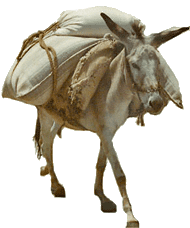Short Stories » The Indians' Test
The Indians' Test
EARLY in the history of the American people, there was a powerful tribe of Indians living close to a white village. The Indians mistrusted the sincerity of the settlers' friendship and showed some signs of this doubt. The white men discovered this and their head men desired a council held to tiy to arrange some definite terms of peace and security.
The Indians listened to the white men and at last one of them answered for the rest: " We have come at your request and heard your talk. It is near night. If you expect us to have confidence in you, that we may feel safe in your coming and going among us, prove it by letting one of your children spend the night with us, and we will bring him to you in the morning." These words caused a great sensation in the hearts of the white men, but they knew that a refusal would seal upon them the enmity of the Indians. One brave man left the room, and in a few moments returned with his only son. In the presence of all assembled, the father told his son how the safety of the whole settlement, and perhaps other towns also, depended upon the fulfillment of this obligation. He told his child that God would watch over him and bring him back in safety. The dear boy, who was about six years of age, listened in implicit confidence, and expressed his willingness to go and not fear the red men.
As the strange company of warriors filed out of the settlement, the pretty boy looked back with smiling face and cried, " Good-night," while hardy men retained their feelings only until he could no longer discover their faces. Then, with full hearts, tearful eyes and trembling tongues, they re-entered the building and fervently besought God to watch over the precious hostage lent. Few slept that night; mothers clasped their babes, and, weeping, prayed. The earliest day-light found watchers gazing upon the distant line of forest that bordered the plain. At last, figures were dimly seen approaching, then faster and faster they came, until the fair face of the beloved child could be seen. The chief himself led him by the hand to his parents, and then and there ratified for his people the compact of peace and defense with the whites. The child said that they treated him with kindest care, gave him curious things to please him, and made for him a bed of softest furs.
How beautiful was this child's obedience and faith, and of what inestimable value was his courage to that village! I wish that I could tell you his name, but have searched in vain for the lost book in which I read it. How proud must have been every heart whose life was thus weighed in the mighty balance against his single one ! Perhaps many times that we know not of, great importance may rest upon the obedience of each one of us, in our path of life as Latter-day Saints.
The Indian'S Test - Takeaway for Class 1,2,3
Always be honest and true to your word, just like the poor man in "The Indian's Test" who kept his promise and was rewarded.
The Indian'S Test - Takeaway for Class 4,5,6
Sometimes showing bravery and honesty, like the young Indian boy, is more valuable than winning a competition.
The Indian'S Test - Takeaway for Class 7,8,9
The story teaches us the importance of cleverness and understanding others' perspectives to solve problems and overcome challenges.
3 Fun Facts
- The story revolves around an Indian boy named Mehul who faces a challenge to remove a rock from a field as a test of his strength and intelligence.
- To solve the problem, Mehul cleverly uses a lever made from a thick stick and his strength, showing that smart thinking is just as important as physical strength.
- The story teaches the valuable lesson that using your brain along with your brawn can lead to success in overcoming challenges.
Quiz for Class 1,2,3
- What did the rich businessman ask the Indian to do with the money left on the table?
- How did the Indian prove that the businessman could not have stolen the money?
- What did the Indian and the rich businessman learn from each other at the end of the story?
Quiz for Class 4,5,6
- What did the Indian chief want to test about the three young men in the village?
- How did the young men try to impress the Indian chief during the test?
- What lesson did the Indian chief want the young men to learn from their experience?
Quiz for Class 7,8,9
- What was the king curious to find out about the Indian concerning his jewel?
- How did the Indian prove that he was telling the truth about the stolen jewel?
- What lesson did the king learn from the Indian's clever test?
Was this article useful?
We’d love to hear from you! Share your valuable feedback and suggestions to help us improve your experience and serve you better.
❤️ If you’re happy with our website, please consider supporting us — Donate Now!
🌟 Or leave a positive review here to encourage our team!















